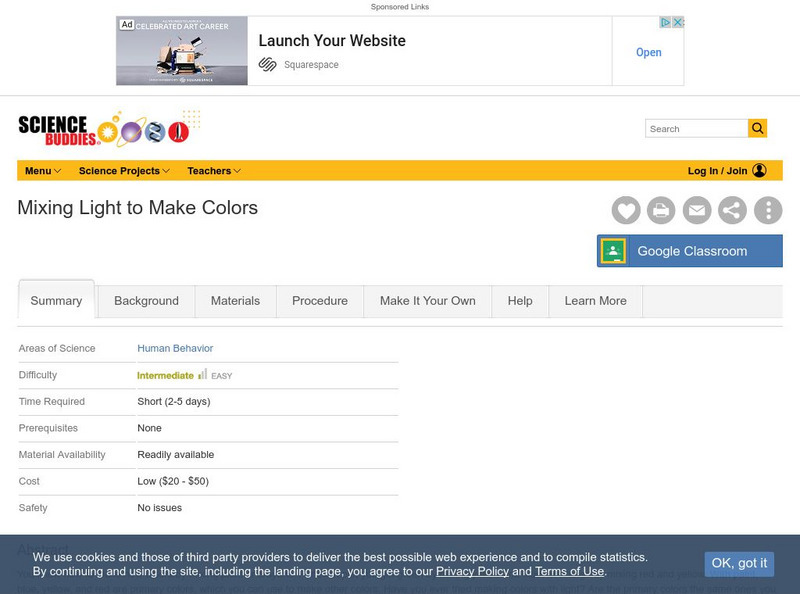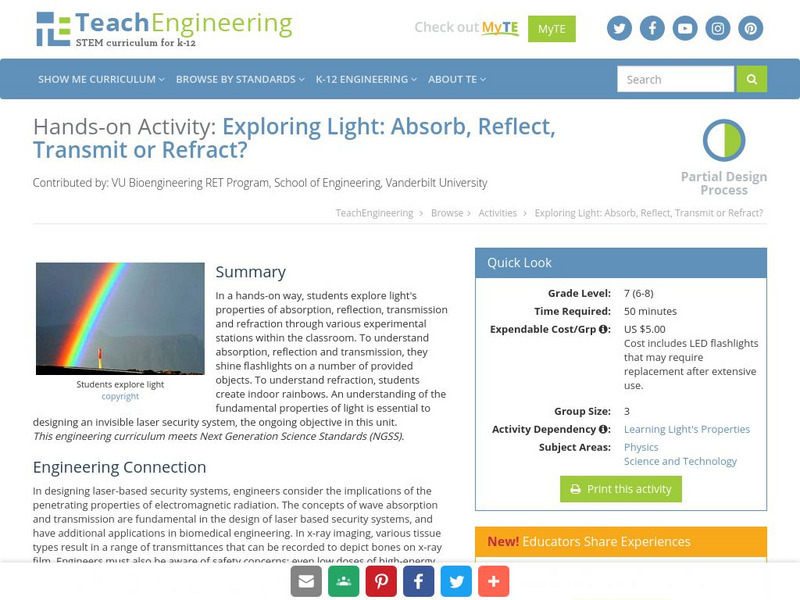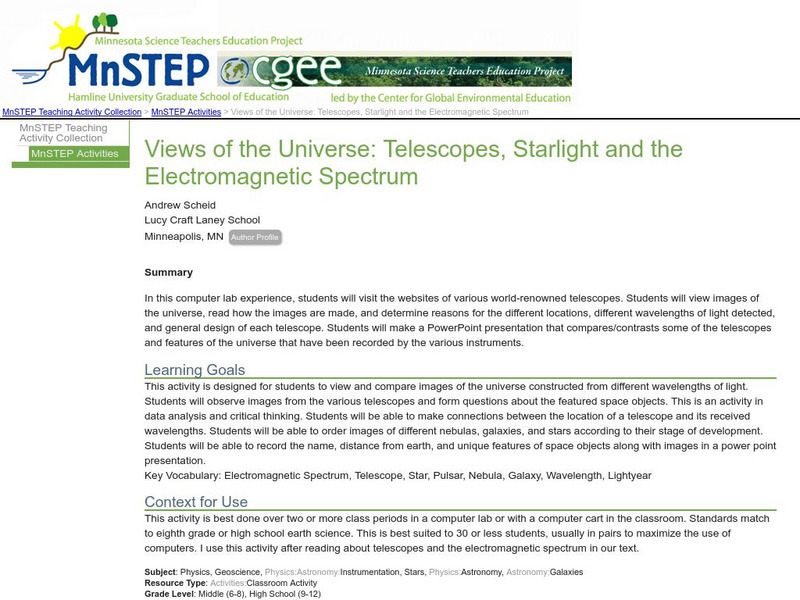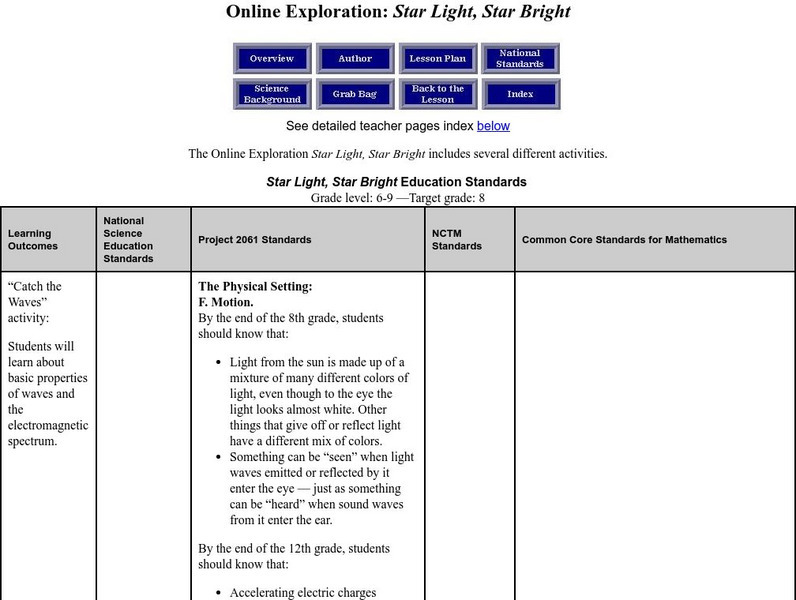Mocomi & Anibrain Digital Technologies
Mocomi: What Is Scattering of Light?
Do you know why the sky is blue? Article defines scattering and how it works. Explains the difference between the scattering of light and reflection or refraction.
Science Buddies
Science Buddies: Mixing Light to Make Colors
You know how to make new colors by mixing paint or crayons. For example, you get green by mixing yellow and blue, or orange by mixing red and yellow. With paint, blue, yellow, and red are primary colors, which you can use to make other...
Physics Classroom
The Physics Classroom: Light Waves/color: Two Point Source Interference Pattern
Students investigate the underlying causes of two-point source interference pattern. They also discover that the spatial separation between the antinodal and nodal lines in the pattern is related to the wavelength of the waves.
University of Colorado
University of Colorado: Physics 2000: Electromagnetic Waves
Using a student-teacher dialogue format, this page discusses the nature of light as an electromagnetic wave and the electromagnetic spectrum.
TeachEngineering
Teach Engineering: Exploring Light: Absorb, Reflect, Transmit or Refract?
In a hands-on way, students explore light's properties of absorption, reflection, transmission and refraction through various experimental stations within the classroom. To understand absorption, reflection and transmission, they shine...
Lawrence Berkeley National Laboratory
Berkeley Lab: The Particle Adventure: Wavelength, the Cave
This analogy story explains the manner in which the wavelength of light affects the maximum resolution of a microscope.
University of Colorado
University of Colorado: Ph Et Interactive Simulations: Blackbody Spectrum
An interactive simulation that teaches about blackbody, sun, light, and quantum mechanics. Students learn my making observations while changing the temperature with a sun, a light bulb, an oven, and the Earth in order to see the changes...
BBC
Bbc: Gcse Bitesize: Why Do Scientists Think That Light and Sound Are Waves?
Light travels as transverse waves and can travel through a vacuum. Sound travels as longitudinal waves and needs to travel through a solid, liquid or gas. Read about the properties of light and of sound, and learn the differences between...
CK-12 Foundation
Ck 12: The Quantum Mechanical Model
[Free Registration/Login may be required to access all resource tools.] In the following online tutorial students will calculate the wavelength, frequency, and energy of light using Planck's constant and the speed of light. They will...
University of California
Uc Berkeley: How Do You Measure a Light Wavelength?
Cool science site tests your knowledge of light by exploring the question: "How do you measure a light wavelength?" Allows users to test themselves as well as provides additional activities on wavelength and amplitude.
Physics Classroom
The Physics Classroom: Light Waves and Color: The Path Difference
After looking at a representative two-point source interference pattern with accompanying order numbers, students investigate the rationale behind the numbering system, and develop some mathematical equations that relate the features of...
Physics Classroom
The Physics Classroom: Light Waves/color: Electromagnetic and Visible Spectra
This illustrated physics tutorial explains the electromagnetic and visible spectra of light using illustrated examples and interactive practice problems.
CK-12 Foundation
Ck 12: Chemistry Simulation: Neon Lights
[Free Registration/Login Required] Neon lights are a type of discharge tube. Observe how electrons create colored light in a hydrogen gas discharge tube. Can you figure out why hydrogen's emission spectrum contains more than one color of...
Science Education Resource Center at Carleton College
Serc: Views of the Universe: Telescopes, Starlight, Electromagnetic Spectrum
Students visit the websites of various world-renowned telescopes, view images of the universe, read how the images are made, and determine reasons for the different locations, different wavelengths of light detected, and general design...
PBS
Pbs Learning Media: Wavelength
In this interactive activity adapted from the University of Utah's ASPIRE Lab, students will learn how to measure wavelengths and see how wavelength affects the color of the light that we see.
Space Telescope Science Institute
Amazing Space: Star Light, Star Bright
This online exploration provides an opportunity to identify the different properties of waves and the relationship that exists between energy, wavelength, and frequency. Correlate images from the Hubble Telescope to the wavelength,...
South Carolina Educational Television
Etv: Nasa Online: Light: Scattering Light
An introduction to the concept of the visible light spectrum provided in an animated format.
Physics Aviary
Physics Aviary: Practice Problems: Light From Atom
Determine the wavelength, in nanometers, of light emitted from an atom.
NASA
Nasa: Tour of the Electromagnetic Spectrum: Visible Light
Visible light waves are the only electromagnetic waves we can see. We see these waves as the colors of the rainbow. Each color has a different wavelength. Red has the longest wavelength and violet has the shortest wavelength. When all...
Science Struck
Science Struck: Wavelength of Visible Light Spectrum
Explains where visible light fits into the electromagnetic spectrum and the wavelengths for the different colors we see.
University of Texas at Austin
The University of Texas Mc Donald Observatory: Super Gelatin
Students measure the angles of refraction of laser light traveling through gelatin, then plot their data to calculate the gelatin's index of refraction.
BBC
Bbc: Gcse Bitesize: General Properties of Waves
Light travels as waves. Waves can be described by their amplitude, wavelength and frequency. The speed of a wave can be calculated from its frequency and wavelength.
University of Colorado
University of Colorado: Ph Et Interactive Simulations: Color Vision
An interactive simulation that teaches about photons, monochromatic light, white light, and rainbows through changing wavelengths, beams, filters, and color combinations. This simulation can either be downloaded or played online and...
University of Colorado
University of Colorado: Ph Et Interactive Simulations: Blackbody Spectrum
How does the blackbody spectrum of the sun compare to visible light? Learn about the blackbody spectrum of the sun, a light bulb, an oven, and the earth. Adjust the temperature to see the wavelength and intensity of the spectrum change....











